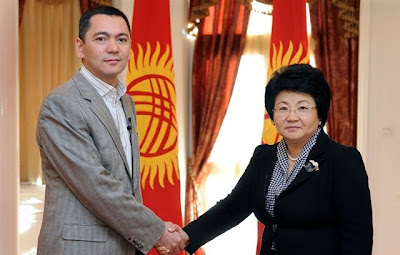
Troublesome Coalition Formation in Kyrgyzstan
By Erica Marat
After weeks of negotiations, the Social-Democratic Party of Kyrgyzstan (SDPK) finally formed a ruling coalition with the Ata-Meken and Respublika parties. The coalition, however, fell apart the next day when Ata-Meken party leader Omurbek Tekebayev failed to gain enough votes to be elected parliament speaker, a position he coveted since becoming MP.
Several members of the Respublika party prevented Tekebayev from earning the position. From the very beginning, Respublika was against Tekebayev’s leadership.
President Roza Otunbayeva has now granted Respublika the responsibility to form a coalition. The party will have several weeks to do so. Respublika’s deputy chief, Bakyt Torobayev, has said that the party is seeking to form a wide coalition comprising either all or four out of five parties represented in the parliament. All five political parties have agreed to form a special working group that would facilitate the process of coalition formation.
Even if Respublika is unable to gather all parties into one alliance, the likelihood that Ata-Jurt will be included in the ruling coalition is high. Ata-Jurt is infamous for its nationalist views; most of its members are still loyal supporters of deposed president Kurmanbek Bakiyev. Ata-Jurt’s inclusion in the ruling coalition, however, will bridge the gap between the so-called “northern” and “southern” parties. Indeed, Ata-Jurt’s main electorate is concentrated in the country’s south.
Whatever the interplay, Respublika’s leader, Omurbek Babanov, will seek the prime minister position. He will likely be challenged by SDPK’s Almazbek Atambayev, who has been determined to earn the post.
Ata-Meken, in the meantime, is facing a leadership problem. Tekebayev has become a victim of his own achievement. He authored the current constitution that allows for transparent and balanced political leadership. Tekebayev’s opponents, however, have used the process of coalition formation to marginalize him within the parliament.
Kyrgyzstan today lacks a functional government and parliament. Its judicial system is deeply ineffective and the president’s control over police forces is lacking in southern parts of the country. Yet, there are grounds for optimism. The prolonged process of coalition formation has considerably improved the parliament’s transparency. Voters and mass media are able to observe what guides individual MPs and their parties. Distribution of key government posts is an obvious divide behind coalition formation.
The coalition formation process has also been a steep learning curve for MPs who have never before had to function is such a transparent environment. If a stable coalition emerges, for the first time in its post-Soviet history Kyrgyzstan might be experiencing elements of deliberative politics. Judging from the past two months, however, a coherent, ruling coalition is still far away.




